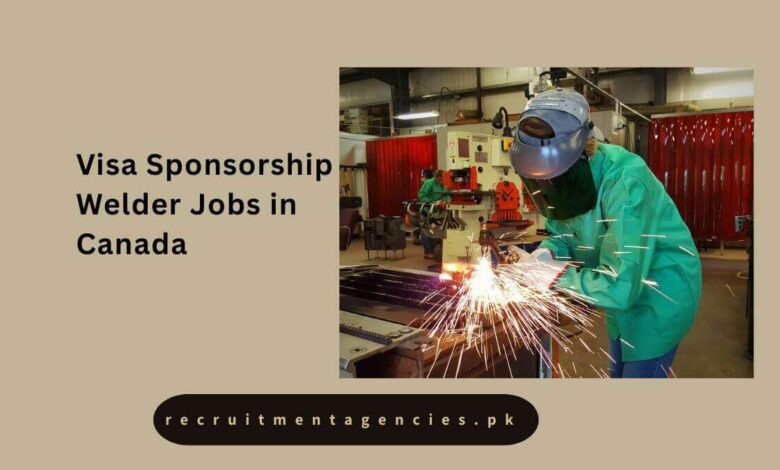Visa Sponsorship Welder Jobs in Canada 2025 – Apply Now

The demand for qualified welders in Canada remains substantial, spanning various industries, such as oil and gas, manufacturing, and construction. To resolve this shortage, numerous Canadian employers are offering visa sponsorship to highly qualified foreign welders, which offers a potential for permanent residency and employment.
Check Also: Poultry Farm Worker Jobs in Canada with Visa Sponsorship

Details:
| Country | Canada |
| Job | Welder |
| Education | Not Required |
| Experience | 1-2 Years |
| Who Can Apply? | All Nationalities |
| Visa Sponsorship | Yes |
Types of Visa Sponsorship Welder Employment in Canada:
Canada may be a nation that gives various prospects for master welders looking for work and visa sponsorship.
- Welders are in high demand in various sectors, such as shipbuilding, fabrication, and mechanical development, throughout the country.
- Structural welding is a specialized occupation that is typically reserved for the construction of large foundations, bridges, and buildings.
- Welders are employed in the motor vehicle industry to facilitate the assembly and production of vehicle components.
- Artistic welding is an exceptional method for innovative and inventive projects. Welders can enhance their abilities by creating metal sculptures, enhancing designs, or sculpting shapes.
- Welders for robots: As industries strive to adopt more sophisticated mechanical systems, there are emerging opportunities for welders who are ensnared in the integration of mechanical technology and computerization.
Welder aptitudes and qualifications:
Welders utilize an assortment of abilities to total their jobs viably, which can incorporate
- Exceptional communication skills, including both written and verbal capabilities
- Capacity to analyze designs
- Expertise in the field of metallurgy
- An understanding of a variety of welding procedures, including TIG, MIG, circular segment, and oxy-fuel welding
- Working knowledge of both manual and mechanical welding methods
- Proven experience as a welder
- I have experience with a variety of welding strategies and hardware, including TIG and MMA.
- experience in the operation of manual or electrical instruments, such as callipers, compasses, and saws.
- Proficient in the analysis and interpretation of specialized archives and drawing
- There should be a willingness to employ defensive clothing, such as gloves and a facial shield, and an understanding of the appropriate security measures.
- Skill and attention to detail
- Fluent in the English language
- A pertinent apprenticeship program must be successfully completed.
- A professional certification, such as an AWS welding certificate, would be advantageous.
Welder obligations and responsibilities:
Welder’s particular obligations may vary depending on the industry they work in and how much experience they have, but they regularly incorporate:
- Prior to initiating an undertaking, it is crucial to read and comprehend outlines.
- Obtaining the materials that will be employed in the endeavour
- Accurately measuring and trimming materials to meet specific requirements
- Utilizing the appropriate materials to connect the metals, welding materials are employed.
- Verifying the completed work to ensure that it is in accordance with the specifications specified in the blueprints
- Arrange format and procedures by reading outlines and illustrations and taking or studying estimations.
- Determine the appropriate welding strategy or hardware in accordance with the specifications.
- Set up welding components in accordance with the determinations (e.g., cut fabric with powered saws to coordinate measurements).
- Utilize point processors to organize the components that require welding.
- Utilize fastening pieces, rulers, and callipers to align components.
- Weld components in various positions, including vertical, horizontal, and overhead, using manual or semi-automatic welding equipment.
- We can repair machinery and other components by filling gaps and welding parts.
- Examine and assess welded structures and surfaces to find any flaws.
- Equipment must be maintained in a manner that does not jeopardize safety.
Benefits:
- Business Stability:
Welding is a critical occupation that is in high demand throughout Canada, and candidates who excel in this field are consistently sought after. The security of employment in a discipline with significant job opportunities is provided by supporting a visa. - Competitive Wages:
Welders in Canada typically receive competitive compensation, which enables them to maintain a comfortable standard of living and financial stability. - Progression Opportunities:
Welders in Canada have the opportunity to advance to more lucrative positions or specialize in specific welding disciplines that require additional certifications and experience. This provides them with opportunities to advance in their professions. - Quality of Life:
Canada is renowned for its exceptional standard of living. Sponsored labourers and their families are eligible for exceptional social services, education, and medical care. - Cultural Distinction:
Canada may be a nation that has undergone significant transformation and is inclined to extend a warm welcome to all. By receiving funding to work in Canada, welders have the opportunity to explore the country’s diverse cultures and provide support, thereby improving the quality of life. - Changeless Residency Pathway:
Canada implements visa-back programs that facilitate changeless residency. This suggests that welders and their families have the option to relocate to Canada and establish a contemporary lifestyle. - Work-Life Adjustment:
Welders are assured of receiving reasonable hours, paid leave, and other health benefits, as work-life adjustment is essential to Canadian labour regulations. - Training and Development Opportunities:
In Canada, employers frequently provide training and development programs to help their employees acquire new skills and advance their knowledge. This is significant because welders must remain informed about industry developments and obsolete procedures. - Safety Benchmarks:
Canada has exceptionally stringent regulations regarding workplace security, which include regulations regarding welding. Welders who are supported can anticipate working in environments that prioritize their safety and well-being.
Salary:
The competitive compensation of welders in Canada is a result of the growing demand for their services and the significance of their work in various industries throughout the country. In Canada, the average hourly wage for welding is between $25 and $35, with the exact amount varying based on the level of experience, work environment, and geographic location. In certain instances, advanced welders may earn an aggregate of over $40 per hour, regardless of their qualifications and proficiency. Additionally, visa-sponsored welders are entitled to supplementary benefits, including retirement plans and therapeutic protection inclusions, which collectively contribute to their overall compensation.
How to Apply?
Simply Apply by clicking the link below:
Frequently Asked Questions:
Can I move to Canada as a welder?
As an experienced welder, you could qualify for immigration to Canada under the Federal Skilled Trades Program (a subcategory of the Express Entry system). Fill out our assessment form today! If you are not familiar with the FSTP, read the following articles first: Federal Skilled Trades Program.
How much is a welder paid in Canada?
The average welder salary in Canada is $45,546 per year or $23.36 per hour. Entry-level positions start at $39,000 per year, while most experienced workers make up to $58,585 per year.
Is a welder in demand in Canada?
In Canada, the demand for the role is high, with new job openings expected to increase to 17,700.



